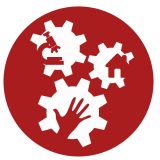There is limited understanding about work and personal life integration measures in the institution
Reviewing the work and personal life integration measures that exist in the organization, analysing the use women and men make of them, how measures could be improved and what other needs workers might have to improve or propose new measures
Problem (evidence)
Aims/objectives
To assess whether work and personal life integration measures are adequate and to identify in which ways they could be improved.
Resources
Human, material and financial resources.
Survey design and survey analysis expertise.
Brief outcomes
Better knowledge of the situation in the RPO concerning work and personal life integration, priorities and recommendations defined by the members of the RPO.
Improvement and creation of new services and infrastructures. For example, there was installation of two baby changing stations, one for male carers and another for female carers. They were the first infrastructure of that kind in the RPO.
Key area
Work and personal life integration
Type of action
Organization
Lisbon School of Economics and Management (ISEG)
Higher education institution
Action level of implementation
All RPO community with a focus on those with commitments and duties of relatives (ascending and descending relatives for example)
Implementation
Legislation does not allow the employer to collect data about personal life of the employees. To overcome that problem a paper questionnaire was developed and disseminated during a Christmas event in December 2017 about the main lines of ISEG’s GEP that related to work-personal life integration. (Likert scale; 41 survey responses were collected). The content of the survey (version attached in Portuguese) was designed based on the actions and general lines of the GEP. The sample was biased towards those who have children (Christmas fest is a family event in ISEG).
The data design, dissemination and collection and analysis was performed by the PLOTINA Team. Based on the survey results, the ISEG PLOTINA team identified challenges and designed strategies and actions of work and personal life integration to overcome these challenges
A similar survey will be repeated in December 2019.
The survey is/was in Portuguese. It corresponds to the measures in the GEP about the work and personal life integration. See attached template worklife_survey.pdf
Challenges
The collection of information from the employees about personal life (family care, family composition, etc.) by the employer entity is not permitted by the general law. It was challenging to collect the information. The anonymous and voluntary survey is not in conflict with legislation on private life.
Implementation is slow because it needs many human and financial resources as well as transformation of usual practices. However, the Art Atelier for Children has already been implemented.
Some actions need a long process of administrative procedures. For example, the creation of new services or infrastructure in a public institution (such as the RPO) needs time to obtain permissions, open calls, allocate the acquisition of material or the services etc.
Tips/strategies – Lessons learnt
Find strategies to overcome the restrictions that exist about: collecting information about the family of employers, building infrastructures and creating services. The survey (voluntary and anonymous) was not collected by the employer, which is an example of overcoming the restriction.
Insufficient resources could be overcome by exploring alternative resource sources (sponsorship from firms).
More detailed Outcomes/Impact
The survey and its analysis led to creating baby changing stations and currently under development is a project review of the summer camp for children and other activities like informatics and programming for kids, science visits for children.
It has also led to consideration of other measures such as the decision from the Governance Bodies about core hours for meetings and the services to be provided (summer camps, kids courses, etc.).
It has contributed towards an “inclusive, diversified and supportive workplace where women and men can conduct excellent research”.
Reflection: what we would do differently
There was some delay in implementing the actions given the available resources.


